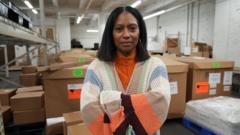With the possibility of new tariffs on imports under Trump's administration, small business owners scramble to adjust, stockpile, and seek new suppliers to mitigate the financial impact.
US Businesses Brace for Impact of Potential New Trump Tariffs

US Businesses Brace for Impact of Potential New Trump Tariffs
Small firms prepare for economic shifts under proposed tariffs as uncertainty looms.
As handbag designer Sherrill Mosee eagerly anticipated her shipment of over 2,700 bags and backpacks from her Chinese supplier, the recent election of Donald Trump as US president made her reconsider her plans. "I'm like, okay, we've got to bring those in," stated Mosee, whose company, MinkeeBlue, is among countless American firms bracing for the anticipated repercussions of Trump's tariff threats. Trump has committed to imposing significant tariffs on imports, targeting Mexico, Canada, and China—USA's leading trade partners.
Earlier this week, Trump tweeted his intention to enforce a 25% levy on goods from Canada and Mexico, alongside an additional 10% tariff on Chinese imports, as part of a broader strategy to implement tariffs of at least 10% on all incoming products. While some experts believe that these measures may signal the start of larger negotiations surrounding migration and drug policy rather than immediate, sweeping changes, businesses are already adapting in preparation for the economic fallout.
According to Chris Caton, managing director at Prologis, there has been a noticeable increase in companies seeking warehouse space to stockpile goods, indicative of the anxiety surrounding potential tariffs. Economist Wendy Edelberg emphasized that whether or not these tariffs materialize, businesses are likely to experience economic disruptions, leading to price hikes and possible shortages of certain products.
Footwear company Steve Madden announced intentions to reduce its reliance on Chinese manufacturing significantly, while Stanley Black & Decker has begun discussions regarding price increases for customers due to tariff implications. Even larger retailers, such as Walmart, have considered similar plans to pre-emptively hedge against rising costs.
Martin Pochtaruk, president of the Canadian solar panel company Heliene, recounted significant challenges faced when tariffs on imported solar panels were imposed in 2018. As a protective measure, his firm has since shifted to American manufacturing and revised contracts to safeguard against unexpected costs. Despite these adjustments, uncertainty regarding future trade relations continues to foster anxiety, particularly as some materials are still sourced internationally.
Longstanding tariffs in various sectors, including clothing and footwear, have demonstrated that they often fail to secure increased employment and instead lead to heightened costs for American consumers and companies. The National Retail Federation has projected that if Trump's tariff proposals go into effect, the financial burden on US consumers could escalate by $46 billion to $78 billion annually for everyday goods.
Furthermore, the recent announcement targeting Mexico, a crucial supplier of food imports, poses questions about Trump’s conflicting trade and price pledges to the American public. Macquarie Capital's Viktor Shvets opined that while risks remain, the fears of market instability may ultimately temper the extent of Trump's trade actions.
For small business proprietors like Mosee, navigating these changes is particularly precarious, with limited financial flexibility. Competing against established brands, she expressed the difficulty of adjusting prices for her products, which typically retail for around $180. Searching for new suppliers in countries like Cambodia and India, she conveyed the necessity of partnership to endure the anticipated challenges of the coming months. "It's going to be hard," she remarked. "It's going to be hard all the way around."
Earlier this week, Trump tweeted his intention to enforce a 25% levy on goods from Canada and Mexico, alongside an additional 10% tariff on Chinese imports, as part of a broader strategy to implement tariffs of at least 10% on all incoming products. While some experts believe that these measures may signal the start of larger negotiations surrounding migration and drug policy rather than immediate, sweeping changes, businesses are already adapting in preparation for the economic fallout.
According to Chris Caton, managing director at Prologis, there has been a noticeable increase in companies seeking warehouse space to stockpile goods, indicative of the anxiety surrounding potential tariffs. Economist Wendy Edelberg emphasized that whether or not these tariffs materialize, businesses are likely to experience economic disruptions, leading to price hikes and possible shortages of certain products.
Footwear company Steve Madden announced intentions to reduce its reliance on Chinese manufacturing significantly, while Stanley Black & Decker has begun discussions regarding price increases for customers due to tariff implications. Even larger retailers, such as Walmart, have considered similar plans to pre-emptively hedge against rising costs.
Martin Pochtaruk, president of the Canadian solar panel company Heliene, recounted significant challenges faced when tariffs on imported solar panels were imposed in 2018. As a protective measure, his firm has since shifted to American manufacturing and revised contracts to safeguard against unexpected costs. Despite these adjustments, uncertainty regarding future trade relations continues to foster anxiety, particularly as some materials are still sourced internationally.
Longstanding tariffs in various sectors, including clothing and footwear, have demonstrated that they often fail to secure increased employment and instead lead to heightened costs for American consumers and companies. The National Retail Federation has projected that if Trump's tariff proposals go into effect, the financial burden on US consumers could escalate by $46 billion to $78 billion annually for everyday goods.
Furthermore, the recent announcement targeting Mexico, a crucial supplier of food imports, poses questions about Trump’s conflicting trade and price pledges to the American public. Macquarie Capital's Viktor Shvets opined that while risks remain, the fears of market instability may ultimately temper the extent of Trump's trade actions.
For small business proprietors like Mosee, navigating these changes is particularly precarious, with limited financial flexibility. Competing against established brands, she expressed the difficulty of adjusting prices for her products, which typically retail for around $180. Searching for new suppliers in countries like Cambodia and India, she conveyed the necessity of partnership to endure the anticipated challenges of the coming months. "It's going to be hard," she remarked. "It's going to be hard all the way around."

















